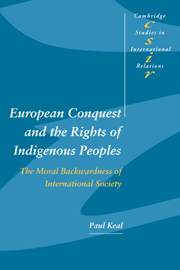 European Conquest and the Rights of Indigenous Peoples
European Conquest and the Rights of Indigenous Peoples Published online by Cambridge University Press: 03 December 2009
This book is about the loss of life, land, culture and rights that resulted from the overseas expansion of European people and states following Columbus' voyages to the Americas in the late fifteenth century. At that time the modern state and with it the European states system was beginning to emerge from the social and political structures of medieval Christendom. By the end of the nineteenth century the states system had developed to the point of being known by its mainly European members as the society of states or international society. The story of the expansion of international society to one that embraced the world as a whole has been written as one of states and the rivalry between them. War and its recurrence has long been assumed to be the central problem of relations between states and a key institution of international society. The loss of life with which this book is concerned is not life lost in war between states or in the numerous post-World War II intrastate wars of the Third World. It is instead the losses that resulted from the arrival of Europeans, from the time of Columbus, in lands inhabited by non-European peoples. The story of the expansion of international society is simultaneously a story of the subjugation and domination of others in historically momentous ways that are frequently overlooked by the emphasis on states and interstate conflict.
To save this book to your Kindle, first ensure no-reply@cambridge.org is added to your Approved Personal Document E-mail List under your Personal Document Settings on the Manage Your Content and Devices page of your Amazon account. Then enter the ‘name’ part of your Kindle email address below. Find out more about saving to your Kindle.
Note you can select to save to either the @free.kindle.com or @kindle.com variations. ‘@free.kindle.com’ emails are free but can only be saved to your device when it is connected to wi-fi. ‘@kindle.com’ emails can be delivered even when you are not connected to wi-fi, but note that service fees apply.
Find out more about the Kindle Personal Document Service.
To save content items to your account, please confirm that you agree to abide by our usage policies. If this is the first time you use this feature, you will be asked to authorise Cambridge Core to connect with your account. Find out more about saving content to Dropbox.
To save content items to your account, please confirm that you agree to abide by our usage policies. If this is the first time you use this feature, you will be asked to authorise Cambridge Core to connect with your account. Find out more about saving content to Google Drive.